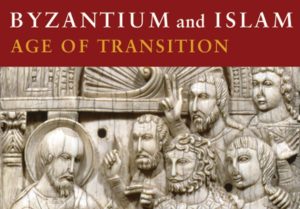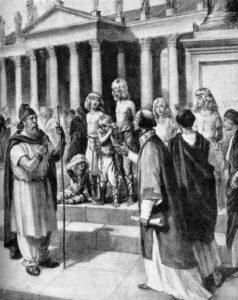Or:
How the Woke monster originated
The following quotes are taken from the chapter ‘Exodus: 632’ of Dominion. Tom Holland begins by talking about something the Byzantine Emperor Heraclius did: forcefully baptise the Carthaginian Jews. As we have seen in my criticism of Richard Wagner from a week ago, this is a fatal error. The litmus test are the genes, as the Nazis well saw; not the faith. But even by the 7th century the values were already so inverted that race didn’t matter, only state ideology.
The site of the [Jerusalem] Temple had been converted into a rubbish tip, a dumping-ground for dead pigs and shit; Jews themselves—except for one day a year, when a delegation was permitted to climb Mount Moria, there to lament and weep—were banned from Jerusalem; legal restrictions on their civic status grew ever more oppressive. It was forbidden them to serve in the army; to own Christian slaves; to build new synagogues. In exchange, Jews were granted the right to live according to their own traditions—but only so that they might then better serve the Christian people as a spectacle and a warning. Now, with his abrupt new shift of policy, Heraclius had denied them even that. [page 180]
What is striking about this passage is what Eduardo Velasco, in his webzine Evropa Soberana, wrote in his master essay on the struggle between Rome and Jerusalem. Yahweh, interpreted psychologically, means a very iron will of the Hebrews. Initially, the republican Romans had the same will, Velasco tells us. But through the imperial centuries, and later due to Christian subversion, that will was diluted; leaving only the will of the Jews to survive as a people. Otherwise, the Greco-Romans would have maintained, clandestinely as the Jews did, the Aryan religion in the face of the destruction of their temples by the Christians.
So it was, in Carthage, that the emperor’s policy was punctiliously applied. Any Jew who landed in the city risked arrest and forcible baptism. All he had to do was cry out in Hebrew when twisting an ankle, or perhaps expose himself at the baths, to risk denunciation. [page 181]
Having to see the dicks of a kike to know that he is a kike only shows that, even since those times, Mediterranean miscegenation had already erased the emaciation line between Aryan and Semitic. From the time when such miscegenation was consummated Rome was lost; Christianity only institutionalized that genetic reality.
Holland then devotes several pages to the greatest historical event of that century: the irruption of Islam. It seems most natural to me that, once the Mediterranean lost the Nordic stock it still possessed during the Punic Wars, the sandniggers would rise and triumph over these Christian mudbloods.
In the event, two sieges were required to wrest Carthage from Christian rule. After the city had been captured the second time, and its inhabitants slaughtered or enslaved, its conqueror razed its buildings to the ground. The masonry was then loaded into wagons and carted along the bay. There, on a hill, stood the small town of Tunis. Long in the shadow of Carthage, its time had now come. The building of a new capital from the rubble of the old proclaimed the triumph of Islam in one of the strongholds of the Christian West: the home of Cyprian, of Donatus, of Augustine. Such a thing was not meant to happen. For many centuries, the Christians of Africa had tended the flame of their faith. Just as the Israelites had followed Moses through the desert, so had they, members of the pilgrim Church, been guided through the centuries by the Holy Spirit. But now a new people, warriors who themselves claimed to be on an exodus, had seized the rule of Africa; and the Africans, for the first time in four hundred years, found themselves under the rule of masters who scorned the name of Christian. As in Jerusalem, so in Tunis, the conquerors did not hesitate to proclaim that a new revelation, God-given and uncorrupted, had superseded the old. It was not churches that were built out of the demolished walls and columns of Carthage, but places of worship called by the Arabs masajid: ‘mosques’. [187-188]
Just as the devastation of Rome didn’t cause any cognitive dissonance to Pope Gregory, mentioned in the previous entry, at this point Europeans were no longer capable of questioning the Christian theocracy when suffering these calamities. We can already imagine the fate the Arabs would have faced before genetically pure, pagan Romans discovering both the scientific method and industrial, military technology. In a nutshell, no Christian takeover of the pagan world, no Islam. (See Deschner’s book in the featured post that shows how the Church took it upon itself to destroy all the classical knowledge accumulated over the centuries.)
Holland then provides an overview of how England came to be, repudiating its pagan past:
It was, however, conveniently located for Rome; and it was from Rome, back in 597, that a band of monks sent by Pope Gregory had arrived in Kent. Britain, the home of Pelagius and Patrick, boasted ancient Christian roots; but many of these, in the centuries following the collapse of Roman rule, had either withered or been pulled up and trampled underfoot. Germanic-speaking warlords, carving out kingdoms for themselves, had seized control of the richest third of the island. Calling themselves variously Angles, or Saxons, or Jutes, they had been proudly and swaggeringly pagan. Rather than accept the Christianity of the conquered natives, as the Franks had done, they had scorned it. All the same, they had kept a careful eye on the world beyond their shores. They had been alert to the potency of Frankish kingship, and to the allure of Rome. When the Pope’s emissary arrived in Britain, he had been given a cautious welcome. The king of Kent, after contemplating the mysteries revealed to him by Augustine, and weighing up the various opportunities that acceptance of them promised, had submitted to baptism. Over the following decades, a succession of other warlords across eastern Britain had done the same. [pages 188-189]
The Anglo-Saxon tribes, like the Germanic ones, never had such a firm will to perpetuate themselves as Hitler would have. The reason for this is that a religion had not yet emerged which had the Aryan race as its basic principle, as National Socialism had. It is vital to understand that both Eduardo Velasco and William Pierce erred in considering Sparta the paradigm to emulate. History tells us loudly that only the Germany of the Third Reich understood the laws of life to the point of elaborating a State that complied with them. Using the metaphor of the recent series on the Nibelung ring, only Hitler had the will to return it to the river nymphs. The rest of the Aryans wanted to have power by possessing it (remember: the Wagnerian tetralogy ends in tragedy).
In the next few pages Holland talks about an Anglian monk, Bede, but I would just like to focus on a single passage:
Bede used, though, what he could. Why had Gregory sent a mission to be the salvation of his people? Because, so Bede reported, he had seen blond-haired boys for sale in Rome’s market and, struck by their beauty, asked from where they came; then, on being told that the slaves were Angles, made a fateful pun. ‘It is fitting,’ he said, ‘for their faces are those of angels—and so they should properly share with the angels an inheritance in heaven.’ [page 192]
On this site, I have already quoted a few words from the preface to Thomas Hubbard’s book, Homosexuality in Greece and Rome, a preface that I read online. I have to get a hard copy and read it all because I get the impression that sexually abusing children by an institution didn’t start in the classical world but in Christendom.
In time, the Saxons and the Jutes would indeed come to think of themselves as sharing a single identity with the Angles—and even to accept their name. Their kingdoms, following their union, would be known as Anglia and, in their own language, Englalonde. Just as the inheritance of scripture had inspired a momentous new configuration of identities in the Near East, so also in Britain. The elements of Exodus, so evident in the stories that Muslims told of their origins, were shaping, at the far end of the world, the cocoon of myth in which another people were being formed: the English. [page 193]
The last pages of the chapter are devoted to the rise of the Franks.
Even as Poitiers was being fought, collections of sayings attributed to Muhammad were being compiled that, in due course, would come to constitute an entire corpus of law: Sunna… The Talmud, an immense body of law compiled by Jewish scholars—rabbis—in the centuries prior to the Arab conquest of the Near East, had never threatened the inheritance of Paul’s teachings as the Sunna did… Few, if any, who fought at Poitiers would have realised it, but at stake in the battle had been nothing less than the legacy of Saint Paul.
‘For you are a chosen people, a royal priesthood, a holy nation, a people belonging to God.’ The Pope, when he quoted this line of scripture in a letter to Pepin, was not merely flattering the Franks, but acknowledging a brute reality. Increasingly, it was the empire ruled by the heirs of Charles Martel—the Carolingians—that defined for the papacy the very character of Christian rule. Paul I, unlike his predecessors, had failed to notify the emperor in Constantinople of his election. Instead, he had written to Pepin. The Byzantines, struggling for survival as they were against relentless Muslim onslaughts, appeared to Christians in Rome—let alone in Francia or Northumbria—an ever more alien and distant people. Even more spectral were the lands that for centuries had constituted the great wellsprings of the Christian faith: Syria and Palestine, Egypt and Africa. The days when a man like Theodore might freely travel from Tarsus to Canterbury were over. The Mediterranean was now a Saracen sea. Its waters were perilous for Christians to sail. The world was cut in half. An age was at an end. [pages 197-198]
If Judeo-Christianity first flourished in Syria and Palestine, Egypt and Africa, it is clear that we are not talking about an Aryan religion for the consumption of pure Aryans, but a mudblood religion for the consumption of mudbloods.


One reply on “Dominion, 6”
Christianity is much viler than Islam – after all, there still are Berbers in Algeria/Morocco (who have recently revived their ancient alphabet), and even the enigmatic Druze and Yazidis in Asia, right next to the cradle of Islam. Meanwhile, we in Europe have been completely lobotomised, to the ends of our continent. The Nordics serving the Jew are a terrible force – from the Teutonic Order to Churchill’s England.
And I will not tire repeating that the 7th century was the last time when Christianity was close to being extinguished – had the Franks had the foresight to ally with the Muslims and uproot the venomous nest in Rome. Alas, that narrow cancerous tumour from Italy to Britain survived and grew.